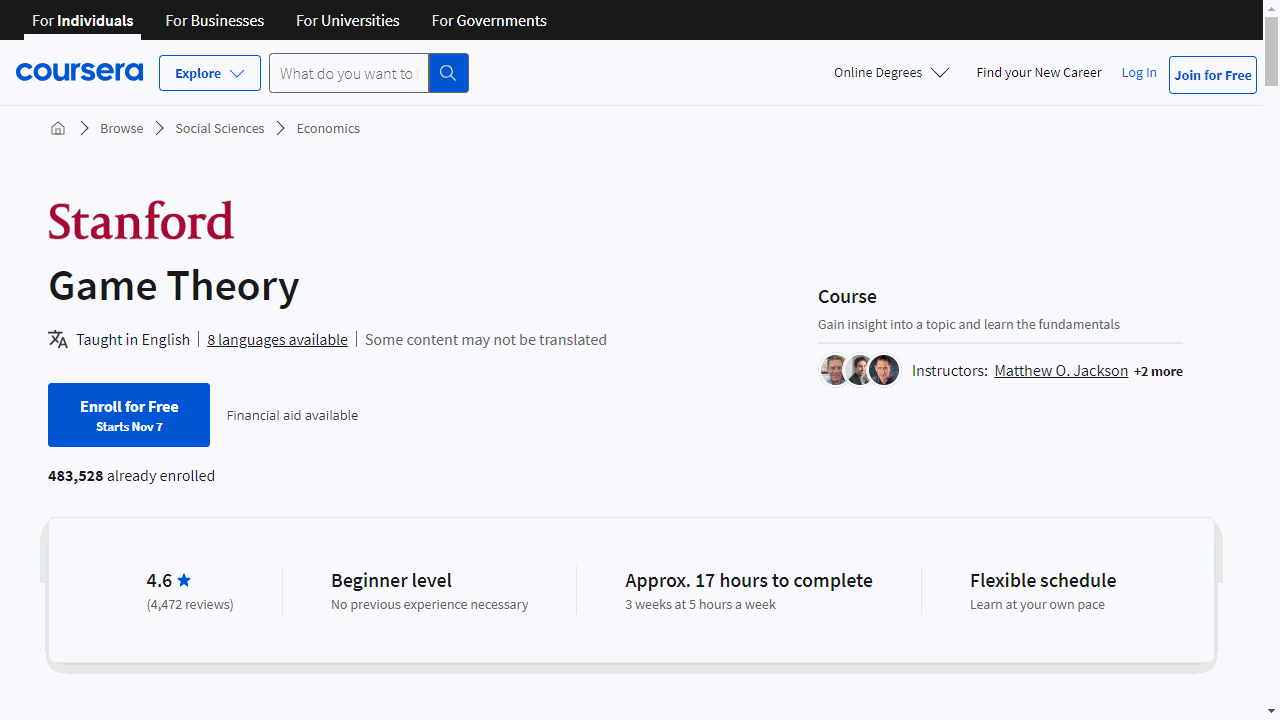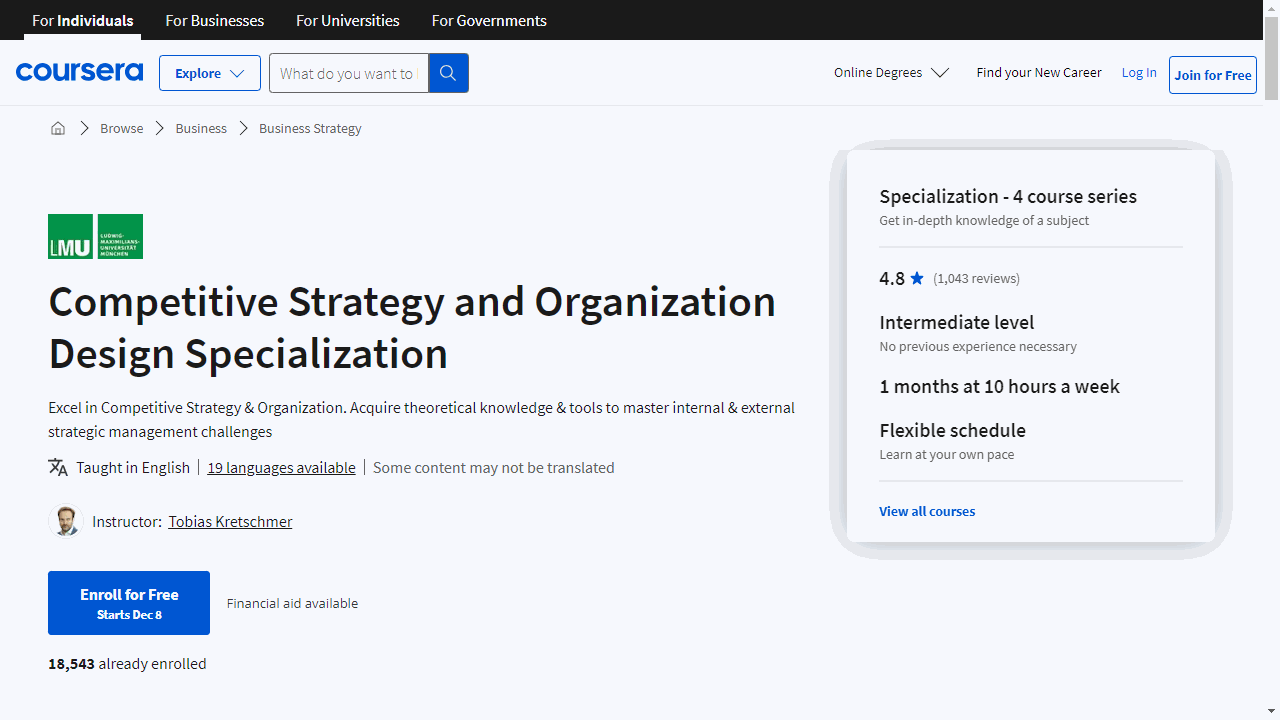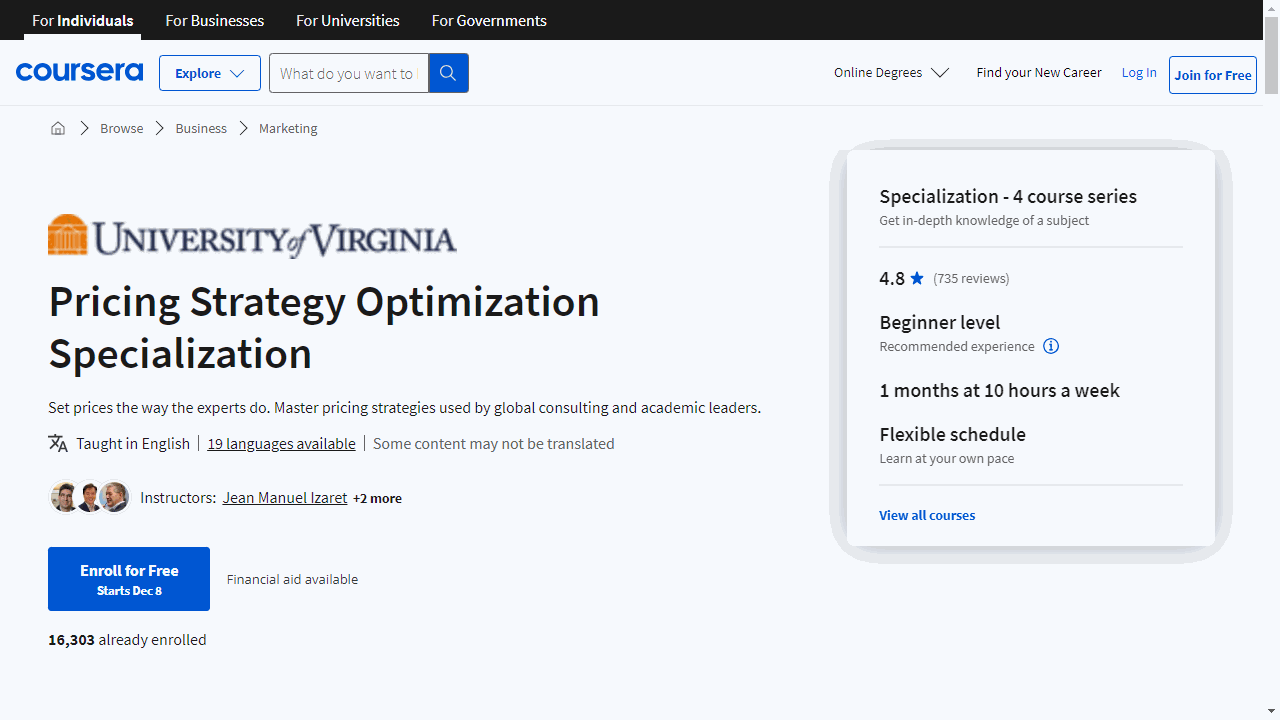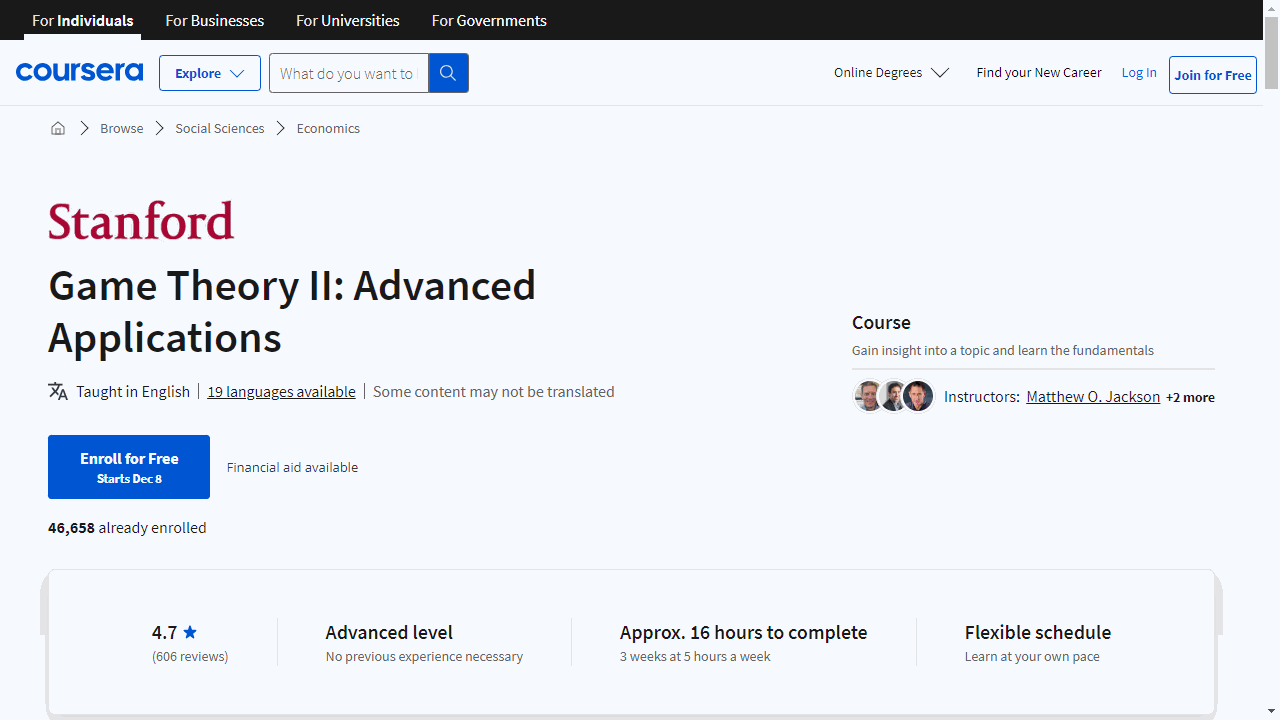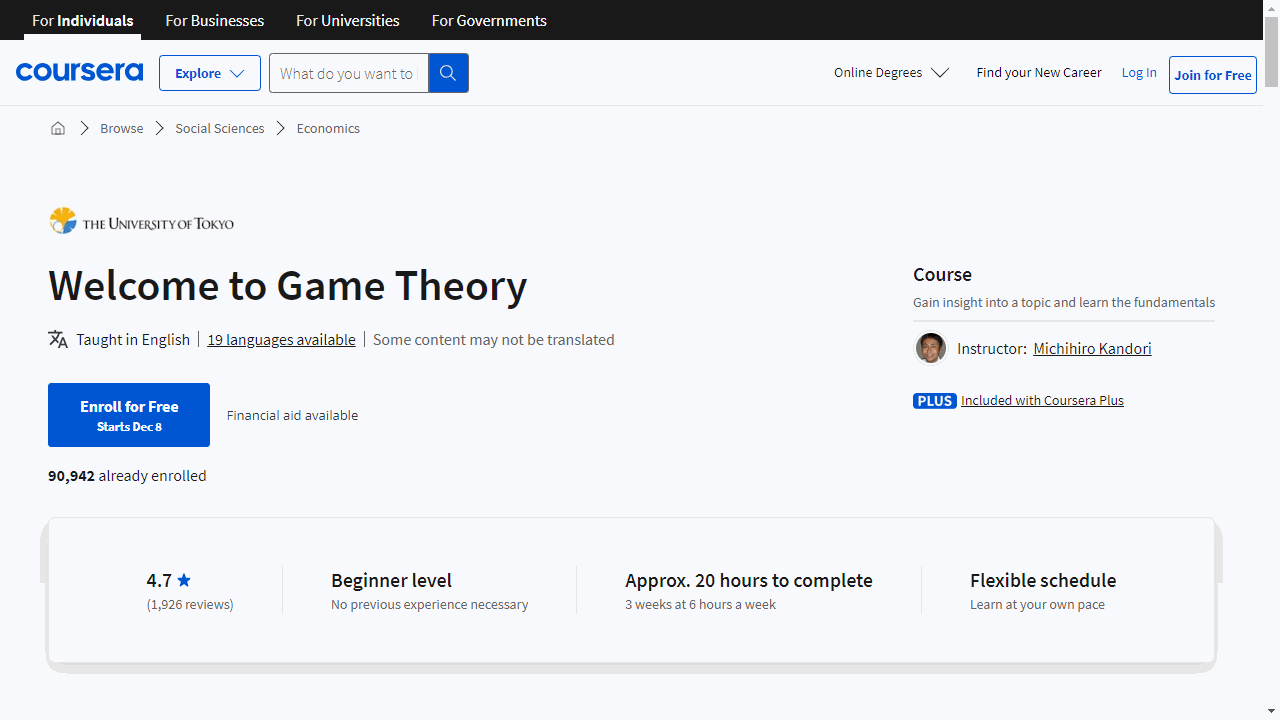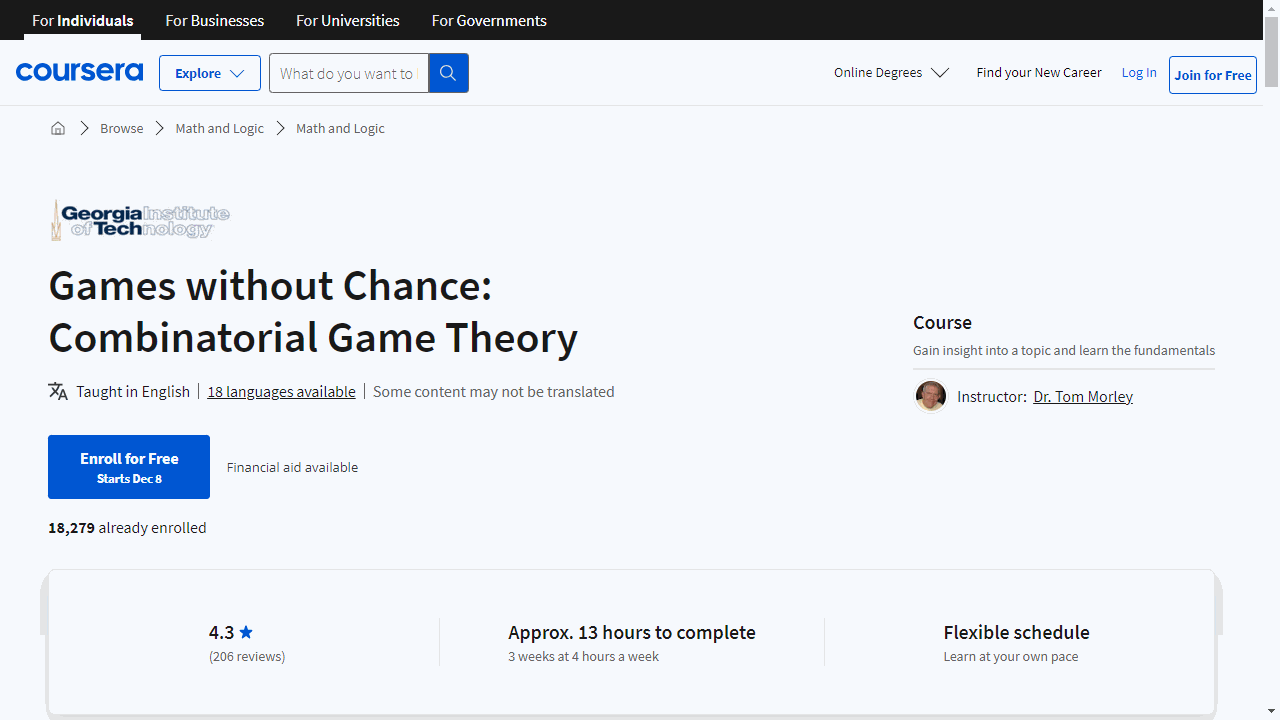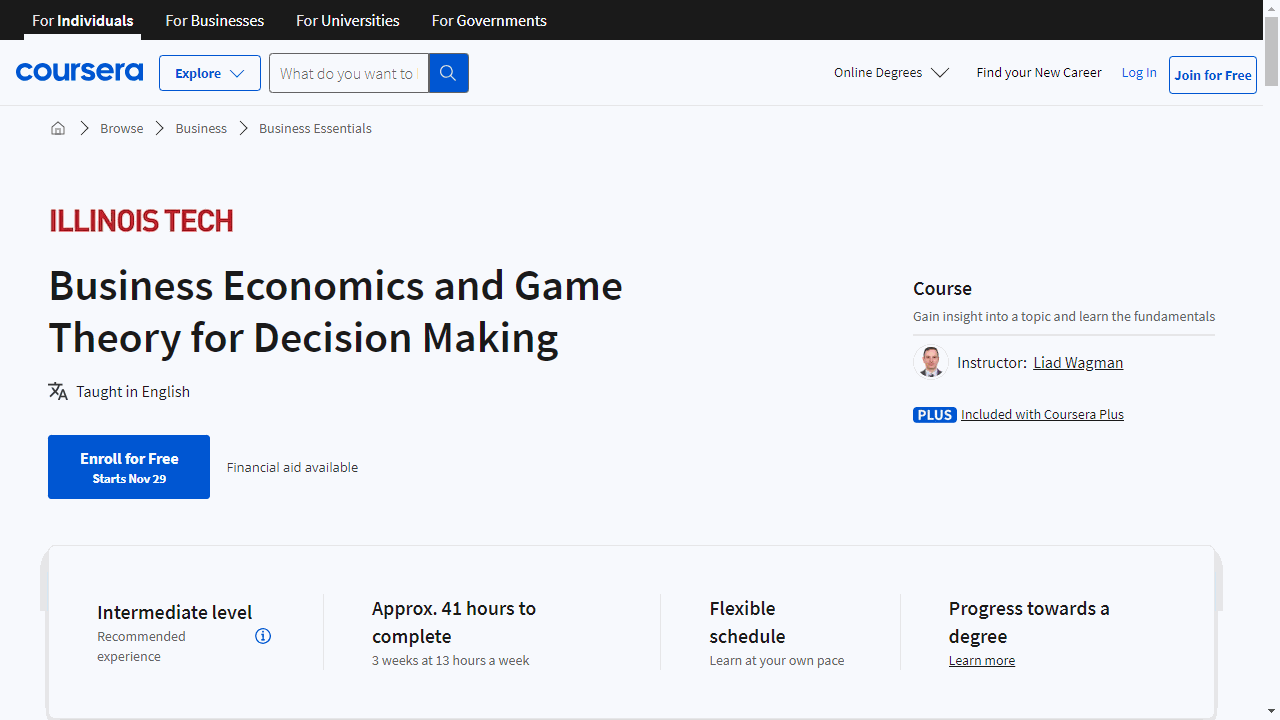Game theory is a fascinating field that explores strategic decision-making in situations where individuals or groups interact.
It studies the motivations and actions of rational players, analyzing how they choose strategies to maximize their outcomes, even when facing uncertainty and the actions of others.
Understanding game theory can offer valuable insights into fields like economics, business, politics, and even everyday life.
If you’re eager to learn more about game theory but struggling to find the right course, you’re not alone.
Navigating the vast world of online learning platforms can be overwhelming, especially when trying to pick the perfect course for your needs.
For the best game theory course overall on Coursera, we recommend Game Theory by Stanford University.
This course is taught by renowned professors and offers a comprehensive introduction to the fundamental concepts of game theory, using clear explanations and real-world examples to make the material engaging and accessible.
But if you’re looking for something more specific, or perhaps a more advanced course, don’t worry!
We have a diverse selection of courses to choose from, covering various topics and levels of expertise.
Keep reading to discover the perfect game theory course for your unique learning journey!
Competitive Strategy and Organization Design Specialization
This specialization is offered by Ludwig-Maximilians-Universität München (LMU).
Start with “Competitive Strategy” to grasp how businesses make strategic decisions that are interconnected.
You’ll learn to use game theory to craft strategies that give companies a competitive edge.
And if you’re a Chinese speaker, there’s a version tailored for you.
Next, “Advanced Competitive Strategy” takes you deeper.
You’ll discover how companies keep customers loyal, set smart prices, and differentiate their products.
It’s about learning the strategies that can transform a business’s market position.
With “Strategic Organization Design,” you’ll understand how to align a company’s internal structure with its external competition.
It’s like getting a blueprint for building a business that can withstand any challenge.
Finally, apply what you’ve learned in the “Competitive Strategy and Organization Design Project.”
You’ll act as a consultant for a real company, tackling actual business problems with your newfound expertise.
As you progress, you’ll acquire valuable skills in strategic management, marketing, and business strategy.
These courses are interactive, filled with real-world examples, and designed to give you hands-on experience.
Pricing Strategy Optimization Specialization
This specialization offered by University of Virginia partners with Boston Consulting Group to equip you with the tools to set prices that maximize profits by delving into cost, customer value, and market competition.
In “Cost and Economics in Pricing Strategy,” you’ll learn to apply economic principles to pricing decisions.
You’ll explore price discrimination, calculate price elasticity, and master pricing models like cost-plus and peak-load pricing.
This course empowers you to make informed pricing choices that can boost your bottom line.
“Customer Value in Pricing Strategy” shifts the focus to what customers are willing to pay.
You’ll discover how to assess customer value and leverage psychological insights to craft effective pricing strategies.
By the end of this course, you’ll be adept at using surveys and conjoint analysis to inform your pricing decisions.
With “Market and Competition in Pricing Strategy,” you’ll analyze how competitor prices influence your own pricing strategy.
You’ll learn to use game theory to anticipate market behavior and respond strategically to competitors’ moves.
This course helps you navigate the competitive landscape to optimize your pricing.
Finally, “Pricing Strategy in Practice” offers a practical application of your new skills.
You’ll tackle a real-world case, using cost, customer, and competition lenses to set strategic prices.
This course culminates in a project that showcases your ability to respond to market disruptions and make data-driven pricing decisions.
By completing this specialization, you’ll gain valuable skills like understanding price elasticity, customer psychology, and competitor pricing models.
Game Theory
This course from Stanford University isn’t just about numbers; it’s a journey into the decision-making processes that shape competition and cooperation in various aspects of life.
The course kicks off with an engaging introduction to Game Theory, using the example of TCP Backoff—a protocol that governs internet traffic—to illustrate complex concepts in a relatable way.
This sets the stage for exploring the motivations and actions of self-interested agents, a foundational element in understanding how and why decisions are made.
As you progress, you’ll learn to define and identify different types of games.
Real-world examples bring these concepts to life, demonstrating the practical applications of Game Theory in economics, politics, and beyond.
The course then introduces the Nash Equilibrium, a cornerstone of Game Theory that reveals how individuals or groups reach a state where no one benefits from changing their strategy.
You’ll also explore mixed strategies, which add a layer of unpredictability to decision-making. This section is particularly insightful, as it includes data from professional sports to show how these theories play out on the field.
The instructor then takes you beyond the basics, addressing more complex scenarios such as games with changing rules or incomplete information.
These lessons are crucial for understanding strategic thinking in dynamic environments.
In the latter modules, the course delves into repeated and coalitional games, where long-term strategy and group dynamics come into play.
You’ll learn about concepts like the Shapley value and the Core, which help determine the contributions and payoffs for individuals within a group.
This course is a deep dive into the mechanics of strategic thinking, offering insights that are applicable well beyond the realm of mathematics.
If you’re ready to think critically and elevate your problem-solving skills, this course is your next smart move.
Game Theory II: Advanced Applications
This advanced course is offered by Stanford University.
It delves into the strategic complexities of game theory, ideal for enhancing your analytical skills.
You’ll kick off with Social Choice theory, examining how individual preferences affect collective decisions and the inherent challenges in creating a flawless voting system, as demonstrated by Arrow’s Theorem.
Moving on to Mechanism Design, you’ll learn to construct systems that incentivize truthful information sharing, a concept central to the Revelation Principle.
You’ll also tackle the tough reality that no single strategy works perfectly in every situation.
The course includes a focused study on Mechanism Design theory, preparing you to understand and apply these principles effectively.
In the VCG mechanism section, you’ll explore strategies for fair collective decision-making, while also recognizing its limitations and the complexities introduced by the Myerson-Satterthwaite Theorem on private information exchange.
Auctions take center stage in the final part of the course, where you’ll dissect various auction types, bidding strategies, and the principles that drive auction success, such as the Revenue Equivalence theorem.
With practical examples woven throughout, this course equips you with the tools to apply game theory to real-world scenarios, enhancing your strategic decision-making capabilities.
Welcome to Game Theory
This course offered by The University of Tokyo breaks down complex concepts into understandable chunks, starting with the basics of game theory and why it’s crucial for solving social problems.
You’ll get to know John Nash, a legend in the field, and his Nash Equilibrium, which is a key idea that helps predict how people and organizations behave.
The course makes learning interactive with a card game tutorial, showing you game theory in action.
As you progress, you’ll tackle the Prisoner’s Dilemma, explore market competition, and discover how Nash Equilibrium influences real-life decisions.
If sports are your thing, you’ll enjoy seeing how game theory applies to athletic competitions.
Rationality is a big theme—you’ll learn what it means for players in a game to be rational and the consequences when they’re not.
The course even reveals how animals like fig wasps use game theory instinctively.
But it’s not all about competition.
You’ll delve into the difference between individual and group rationality and how long-term cooperation can emerge, even among rivals like gas stations.
By the end, you’ll have a comprehensive understanding of game theory’s role in nature and society.
With optional challenges and supplemental readings, you can dive deeper if you wish.
Games Without Chance: Combinatorial Game Theory
This course offered by Georgia Institute of Technology takes you through the strategic universe of games where luck takes a backseat to pure skill.
Starting with the fundamentals, you’ll learn what combinatorial games are, focusing on the roles of two players, Left and Right.
You’ll tackle example problems right from the get-go, building a solid foundation before diving deeper.
Each week brings new concepts and challenges.
You’ll explore Cutcake and Adding Games, discover how numbers can be games, and delve into game simplification techniques.
The course also introduces you to Nim, a classic strategy game, enhancing your understanding of game theory principles.
As you progress, the course reveals the complexities of infinite and loopy games, and you’ll get to grips with advanced concepts like mean values and atomic weights.
These might sound daunting, but the course materials, including lecture slides and extra problems, are designed to make learning accessible and engaging.
Quizzes and their reviews are a core part of the course, allowing you to assess your understanding and pinpoint areas for improvement.
And if you excel, you can earn a badge, certificate, or CEUs from Georgia Tech, adding a professional edge to your newfound knowledge.
With a clear structure, hands-on problems, and comprehensive resources, this course is tailored for those eager to master game theory without the fluff.
Business Economics and Game Theory for Decision Making
This course is offered by Illinois Tech.
Starting with elasticity, the course breaks down how price changes influence demand and profitability.
You’ll work through real-world scenarios and linear demand curves to understand the concepts deeply.
Quizzes reinforce your learning, ensuring you can apply these principles effectively.
The course then navigates the complexities of economic efficiency and government intervention.
You’ll examine case studies that illustrate the unintended consequences of policies like price ceilings and delve into the nuances of externalities.
This module is crucial for understanding the broader economic environment in which businesses operate.
Market power is another critical focus.
Through detailed examples, including a case study on H&M, you’ll learn how companies establish prices and maintain competitive advantages.
The course also covers the ethical boundaries of business strategies, touching on collusion and antitrust policies.
In the final modules, game theory takes center stage.
You’ll explore strategic decision-making in various market conditions, from auctions to oligopolistic competition.
The course demystifies complex concepts like adverse selection, preparing you to anticipate and counteract potential challenges in the marketplace.
By the end of the course, after a comprehensive assessment, you’ll have a robust understanding of business economics and game theory.
